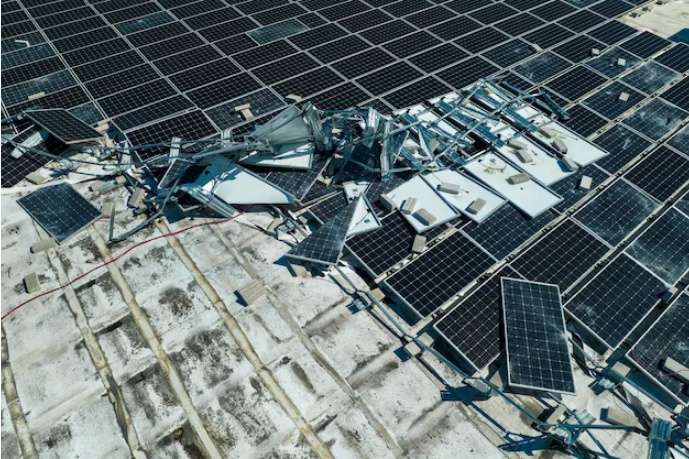Solar panels have long been hailed as a green and sustainable energy source, harnessing the power of the sun to generate electricity. As the world transitions towards renewable energy, solar panels have seen widespread adoption. However, like any technology, solar panels have a finite lifespan and eventually reach the end of their usefulness. This leads to the generation of solar panel waste, a challenge that demands attention and innovative solutions to minimize its environmental impact.
The Solar Panel Lifecycle
Before delving into the challenges and solutions associated with solar panel waste, it's important to understand the lifecycle of a solar panel. A typical solar panel has a lifespan of 25 to 30 years, during which it efficiently converts sunlight into electricity. However, as they age, solar panels may become less efficient, and their output decreases. Eventually, they are no longer economically viable for electricity generation.
When a solar panel reaches the end of its operational life, it needs to be removed and disposed of responsibly. This phase of the lifecycle involves several key steps:
-
Collection: The old solar panels are collected, either from residential installations or large-scale solar farms.
-
Transportation: They are then transported to recycling facilities or disposal sites.
-
Dismantling: At the recycling facility, the panels are dismantled to separate various components, including the glass, aluminum, silicon wafers, and potentially hazardous materials like cadmium in thin-film solar panels.
-
Recycling: The separated materials are recycled, with a focus on reusing as much as possible. Silicon wafers, for instance, can be used in new solar panels, reducing the need for raw materials.
-
Waste Management: Any waste that cannot be recycled or poses environmental risks is disposed of in an environmentally responsible manner, adhering to local regulations and guidelines.
Challenges of Solar Panel Waste
As the number of solar panels in use increases, the volume of solar panel waste is also on the rise. Several challenges are associated with the disposal of old solar panels:
-
Complex Recycling: Solar panels come in various technologies, including monocrystalline, polycrystalline, and thin-film, each with distinct recycling requirements. Dealing with this diversity can be complex.
-
Toxic Materials: Some solar panels, especially thin-film types, contain potentially hazardous materials like cadmium and selenium. Handling and disposing of these materials require specialized processes to prevent environmental contamination.
-
Limited Recycling Facilities: In many regions, recycling facilities capable of handling solar panels are scarce, making it challenging to recycle them properly.
-
Transportation Costs: Transporting old solar panels to recycling facilities can be costly and may deter some from responsible disposal.
-
Regulatory Gaps: There are often regulatory gaps in solar panel waste management, with some regions lacking clear guidelines for recycling or disposal.
Solutions to Solar Panel Waste Challenges
To address the challenges of solar panel waste and minimize its environmental impact, various solutions are being explored:
-
Technological Advances: Ongoing research and development efforts are focused on improving recycling technologies and processes, making them more efficient and cost-effective. Innovations such as automated disassembly and material recovery are gaining attention.
-
Collaboration: Collaboration among solar panel manufacturers, recyclers, and governments is crucial. Stakeholders need to work together to establish efficient collection and recycling systems and develop clear guidelines for waste management.
-
Circular Economy Approach: Adopting a circular economy approach can help reduce waste. Designing solar panels with recyclability in mind and implementing strategies for reusing materials in new panels can minimize resource depletion.
-
Consumer Education: Raising awareness among consumers about the importance of responsible disposal and recycling of solar panels can drive demand for recycling services and increase recycling rates.
-
Extended Producer Responsibility (EPR): Governments can implement EPR programs, shifting the responsibility for proper disposal and recycling of solar panels from consumers to manufacturers. This encourages manufacturers to design products with recyclability in mind.
-
Policy and Regulation: Governments and regulatory bodies should establish clear and enforceable regulations for solar panel waste management. This includes setting recycling targets and implementing penalties for non-compliance.
Environmental Benefits of Proper Solar Panel Waste Management
Implementing proper waste management practices for solar panels offers several significant environmental benefits:
-
Resource Conservation: Recycling solar panels allows for the recovery of valuable materials like silicon wafers, aluminum, and glass. This conserves resources and reduces the need for mining and raw material extraction.
-
Reduced Energy Consumption: Recycling solar panels consumes significantly less energy compared to manufacturing new ones from raw materials. This energy efficiency contributes to reduced greenhouse gas emissions.
-
Hazardous Waste Prevention: Proper recycling and disposal practices prevent the release of toxic materials into the environment, reducing the risk of soil and water contamination.
-
Promotion of Sustainability: Responsible solar panel waste management aligns with broader sustainability goals and helps maintain the environmental integrity of the renewable energy sector.
Conclusion
As the world continues to transition towards renewable energy sources, addressing the issue of solar panel waste is essential. While challenges exist, innovative solutions are emerging to make the recycling and disposal of old solar panels more efficient, cost-effective, and environmentally responsible.
Collaboration among industry stakeholders, government regulations, consumer education, and a focus on the circular economy approach can all contribute to minimizing the environmental impact of solar panel waste. By taking proactive measures now, we can ensure that the renewable energy sector remains a sustainable and environmentally responsible choice for our energy needs, from production to end-of-life disposal. Responsible solar panel waste management is an integral part of building a cleaner and more sustainable future.


No comments yet